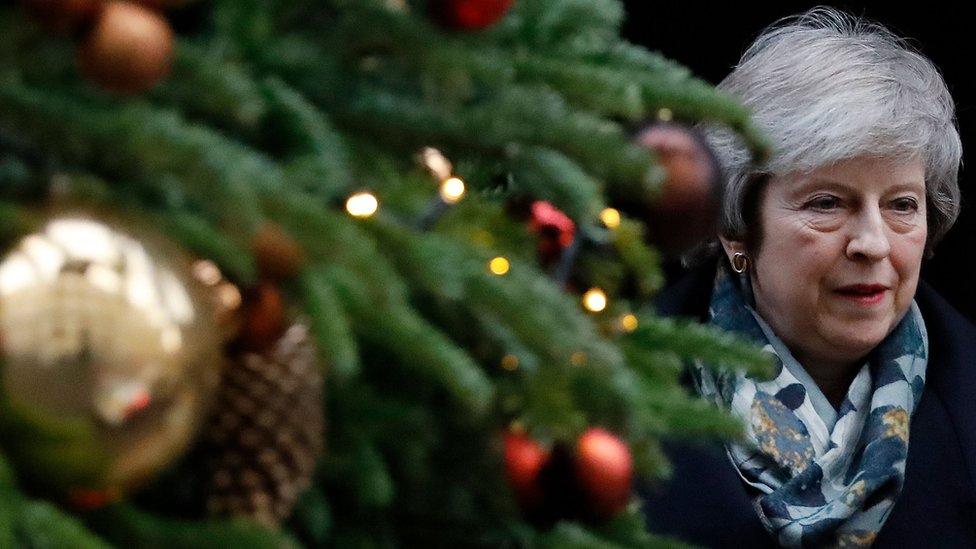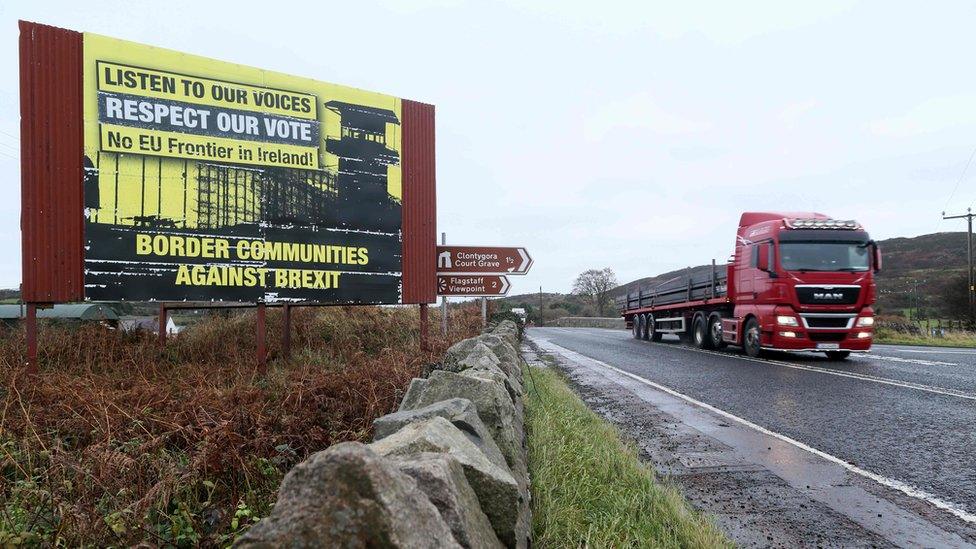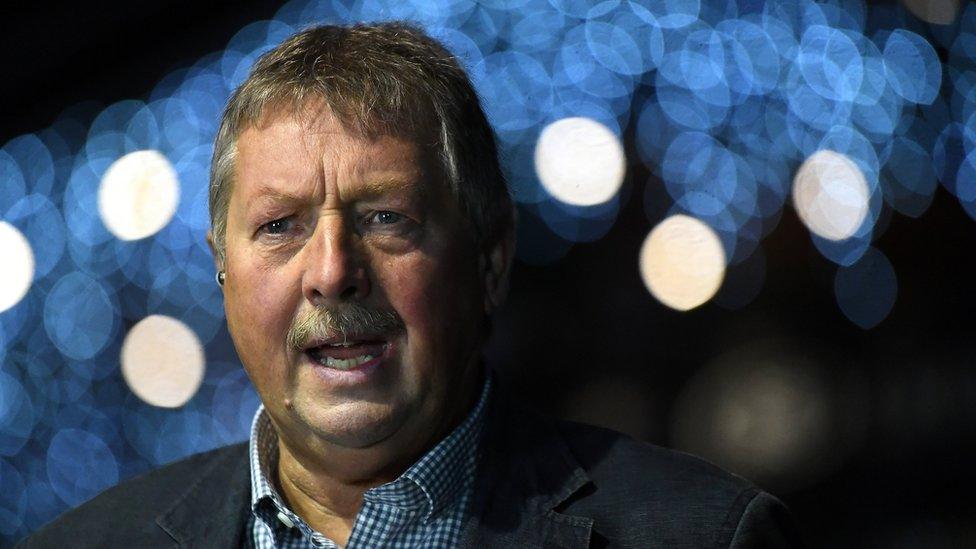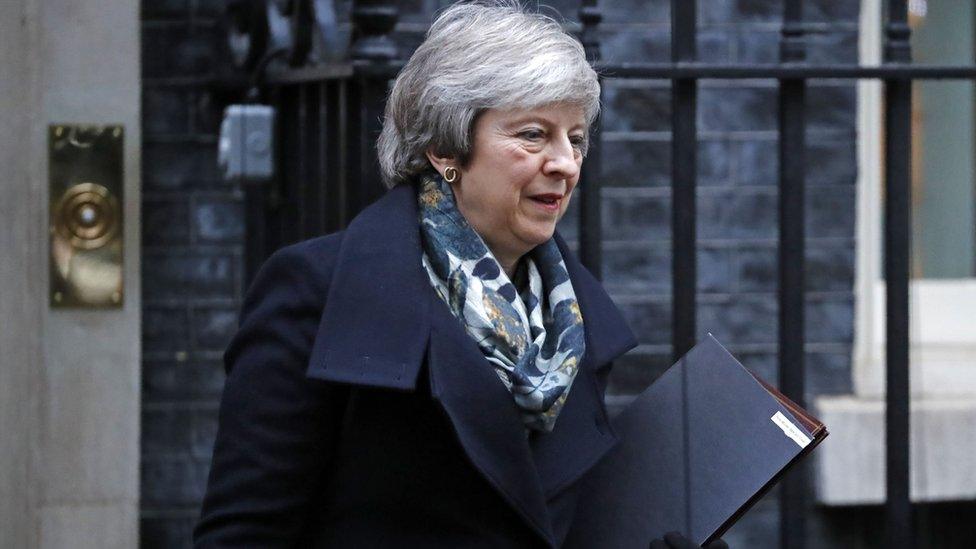Brexit: Risky to up no-deal plans, says shadow NI minister
- Published

Theresa May is "trying to corner" MPs into voting for her plan, claims Karin Smyth
The government is playing a "high-risk strategy" by upping its plans for a no-deal Brexit, a shadow Northern Ireland minister has said.
The cabinet decided on Tuesday to ramp up preparations amid uncertainty around Theresa May's EU withdrawal deal.
But, Labour MP Karin Smyth has accused the prime minister of leading Parliament to a "false choice" of her deal or no deal.
MPs are due to vote on the agreement in the week beginning 14 January.
Speaking to BBC News NI, Ms Smyth said there was no majority in the Commons for a no deal and that the government was "trying to corner" MPs into voting for its plan.
"That's where [Theresa May] has always wanted to take us and that's why she hasn't got the support of her party in the Commons," she added.

The Irish border backstop is the main sticking point in Theresa May's deal
Brexit Secretary Stephen Barclay said the cabinet had agreed that "preparing for a no deal will be an operational priority within government but our overall priority is to secure a deal".
Labour, the DUP and other opposition parties at Westminster have all vowed to reject the government's plan because of the controversial Irish border backstop proposal.
The UK is due to leave the EU on 29 March 2019.

What is the backstop?
The backstop is the insurance policy arrangement aimed at avoiding a return to a hard border - physical checkpoints or infrastructure - along the 310-mile (500km) border between Northern Ireland and the Republic of Ireland after Brexit.
If it took effect, it would see Northern Ireland only remain aligned with the EU single market in some areas, meaning new regulatory barriers between Great Britain and Northern Ireland.
The UK would also not be able to leave the backstop without EU agreement.
DUP and Brexiteer MPs say it should be taken out of the EU withdrawal deal and put into the political declaration between the EU and UK, which is not legally binding and covers potential future relations.
But four pro-remain Northern Ireland parties have called for it to be protected, as well as a number of business and agri-food groups that have urged support for the prime minister's deal.
Read more: The Irish border Brexit backstop

As part of its decision to intensify no deal planning, the government will advise the public and businesses to enact no-deal preparations as they think necessary.
Advice will be sent to households and businesses will be provided with an online pack to help them prepare.
Spending of £2bn has been approved across government departments for the year 2019-20 - the priority areas being borders, security and trade.
'Never seen anything like it'
The DUP MP Sammy Wilson said the odds of a no-deal outcome were shortening.
"I think [the stakes] have got higher for us leaving the EU without any sort of agreement and that's just a fact of life," he said.
"The EU can either come back with a more realistic proposal on the backstop or we leave without having reached agreement with them."

A no-deal Brexit is becoming increasingly likely, says Sammy Wilson
Former Alliance Party leader Lord Alderdice said the lack of consensus about Brexit had led to an unprecedented atmosphere at Westminster.
"I've never seen anything like it at all," he said.
"The Labour Party is being led by someone who wants to see Brexit but doesn't want to take responsibility for it," he said.
"The prime minister wants to deliver Brexit but is finding she doesn't have the support of many of her own colleagues - both remainers and leavers - who are unhappy with the only deal she's been able to do with the EU."
Parliament is due to take recess on Thursday, with MPs expected to return after the Christmas break to debate and vote on the withdrawal deal.
Taoiseach (Irish prime minister) Leo Varadkar said on Tuesday that the absence of a Stormont assembly was a serious problem in that Northern Ireland was without a voice in the run-up to Brexit.
Speaking in the Dáil (Irish parliament), he said attempts to restore devolution at Stormont could only be done after the Brexit deal was ratified by Westminster.
He also revealed that he and the Orange Order had "politely agreed to disagree" about the Brexit backstop during their meeting last month.
- Published18 December 2018
